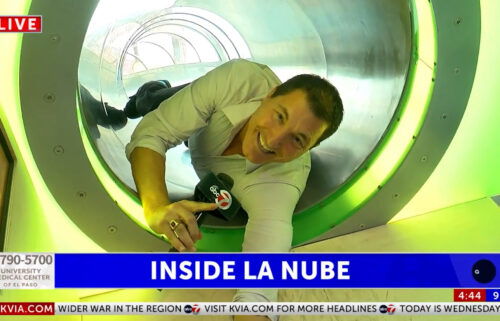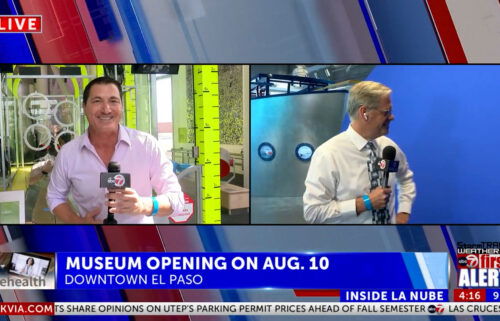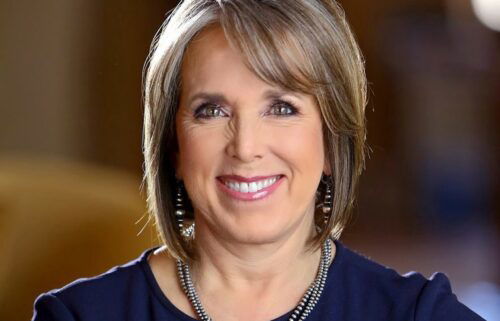Covid-19 ‘long-hauler’ in Oregon shares story of symptoms months after virus
Click here for updates on this story
PORTLAND, Oregon (KPTV) — A clinical nurse educator at OHSU, Stephanie LaRiviere-Miller, is sharing her story about her COVID-19 journey.
She’s part of about one in ten people who experience symptoms months after the virus. They’re called ‘Covid long-haulers.’
Because LaRiviere-Miller believes she had the virus weeks before Oregon even announced its first case, it took months to figure out. Even now that she knows what was consuming her body, 11 months later, she’s still dealing with its effects.
“It started with a very high fever with, as they say, the worst body aches and chills and fatigue like I’d never experienced in my life,” LaRiviere-Miller told FOX 12.
Three weeks later, in late February, she was admitted to the hospital.
“I had myself convinced that I had leukemia or something like that,” she said. “None of it could be explained by hepatitis, drug-induced hepatitis, by anything.”
In the hospital, LaRiviere-Miller lost a large chunk of her liver. She had severe liver inflammation, so doctors narrowed her diagnosis down to the only thing they thought it could be: Drug-induced hepatitis.
LaRiviere-Miller was discharged a week after she was admitted and started feeling a bit better. Then, new symptoms took over her body: Brain fog, shortness of breath, and a range of other problems.
“Honestly, it’s like a bomb went off inside of me. I mean, there isn’t…one body system or part of my body that didn’t become completely changed than what it was prior to COVID.”
It wasn’t until August when a fellow nurse’s shared experience with COVID-19 patients triggered an explanation for LaRiviere-Miller.
“I was like, ‘Oh my God, of course.’ Suddenly, like, every dot, everything that was wrong with me that no one could explain was explainable with one word,” she said.
Today, LaRiviere-Miller approaches one year from her very first fever. She hopes her story educates people who may not be aware that this might be exactly the unexplainable thing that’s happening to them or a loved one.
“I’ve been a nurse for 27 years. I’m a nurse educator. I’ve worked in management in healthcare, so I understand the healthcare system and the hospital really well. I have a very supportive family, husband, great health insurance, and this was still one of the biggest struggles and battles of my entire life,” LaRiviere-Miller told FOX 12. “I had all the things you would want, all the armor you would want in a battle like that, and by far the majority of people that I share this condition with on the support groups aren’t in that same position.”
TREATMENT FOR ‘LONG-HAULERS’
While experts are still learning about ‘long Covid,’ hospitals are beginning to put specialized treatment programs into place.
At Legacy Good Samaritan Medical Center, there is RIO, the Rehabilitation Institute of Oregon.
For months, staff there have blended COVID-19 patients into their normal rehab operations.
“This is the bridge between, I was horribly ill in the hospital, I’m not well enough to go home yet, and this is going to get me better to go home,” said Dr. Jeanne Button, RIO’s medical director.
At Kaiser Permanente, they’re forming a multi-disciplinary team to care for the COVID long-haulers.
“What the pandemic has afforded us is – we don’t need walls to be a clinic…I think we can have people who are specialists, who are dedicated, they have the expertise and they’re just a video conference away,” said Dr. Stella Dantas, Northwest Permanente’s associate medical director of ambulatory and convenient care.
Kaiser Permanente’s working on removing barriers for patients, contacting them as soon as they test positive, then also caring for those with symptoms past 28 days, which includes checking on a person’s entire wellbeing.
“There’s a lot of support, I think, that can be had by just the outreach calls. Just knowing somebody’s touching base, marking sure you’re going in the right direction, or if your trajectory’s different, what support needs to come and what referrals need to be done,” said Dantas.
OHSU is working on developing an evidence-based, patient-centered program for COVID long-haulers, hoping to have it operational in the next month or so.
And at Providence, there are also teams working across the health system to come up with a comprehensive approach specific to the needs of each patient.
Please note: This content carries a strict local market embargo. If you share the same market as the contributor of this article, you may not use it on any platform.




